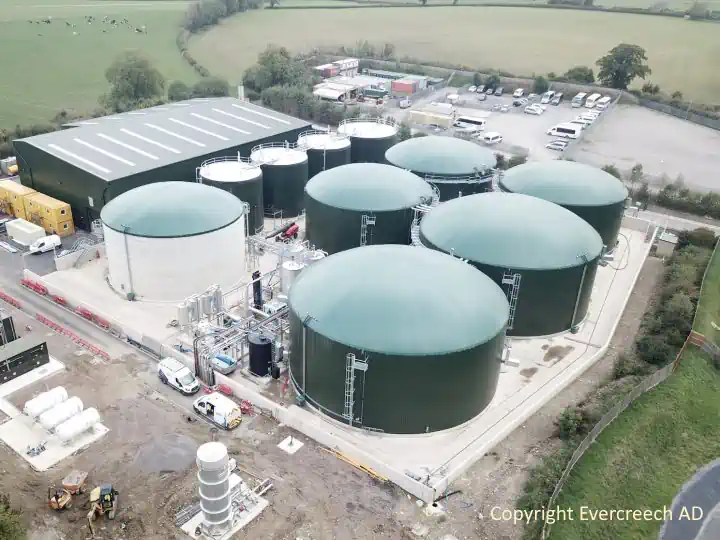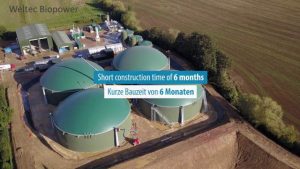In this article, we describe some of the new Anaerobic Digestion Plant (AD) project starts, openings or plants process commissioned so far in 2023. However, overall the number of new AD plants starting to produce biogas is disappointingly low for such a promising technology.
The anaerobic digestion of solid waste can only play its part in carbon reduction if many more biogas plants are started, built, commissioned, and opened. Here is information on the just 3 biogas plants started so far in 2023 that we have found.
Once again, there appears to be a low number of AD Plant starts so far commissioned and announced for 2023 than at any time since the turn of this century.
We set out to give our readers a perspective on the new AD Plant starts and completions, to help our readers gauge the state of the industry in the year of COVID-19 we provide below text from the NNFCC website, which provides an authoritative picture of the current position of the UK biogas industry:
New in 2023: £17 Million Anaerobic Digestion Plant Opens in Norfolk, UK
Date: January 17, 2023
A significant upgrade project was completed in Norfolk, UK, resulting in the opening of a state-of-the-art anaerobic digestion (AD) plant in the February to April period of 2023. The £17 million investment has led to the establishment of a new facility alongside an existing agricultural AD plant in Attleborough. The funding for the project was provided by Privilege Finance, while the site will be managed by Eco Verde Energy, a company with nine other biomethane production sites across the country.
The newly upgraded AD plant has a capacity of processing 100,000 tonnes of food and organic waste per year. This capacity allows it to generate an impressive 87-gigawatt hours of biomethane annually, which can supply the energy needs of approximately 4,000 homes in Attleborough. During the summer months, the site can meet 100% of the town's gas requirements, while during winter, it can provide 50% of the necessary energy.
Marc Graham, the project development manager at Privilege Finance, highlighted the unique aspect of the Attleborough project—its ability to create a circular economy. By utilizing local organic waste, the plant generates renewable energy that powers both homes and businesses within the town.
This approach effectively reduces the need to transport waste to other sites outside the county. Additionally, the plant is expected to save around 15,819 tons of carbon dioxide emissions annually, contributing to the UK government's goal of achieving net-zero emissions by 2050.
Furthermore, the new AD plant opening has created eight jobs in the local area. With its significant capacity and ability to produce renewable energy, this plant marks an important milestone in sustainable waste management and energy generation in Norfolk.
New Anaerobic Digestion Plant Approved in Darwen, UK for 2023
Date: February 21, 2023
In a recent planning committee meeting, Blackburn with Darwen Council approved SUEZ recycling and recovery's plans to construct a new anaerobic digestion plant in Darwen. This plant aims to utilize bacteria to break down food waste, generating enough biomethane to power nearly 7,000 homes.
The anaerobic digestion facility will be built on SUEZ's 18-acre resource recovery park off Lower Eccleshill Road. This site already had permission for another energy-from-waste facility focusing on converting non-recyclable waste into electricity. However, the newly approved anaerobic digestion plant will specifically target the destruction of organic and food waste to create energy.
SUEZ has expressed readiness to build either facility and will decide based on government reforms to waste and recycling policies. The approved anaerobic digestion plant will span 30,100 square feet and have the capacity to process 100,000 wet tonnes of organic and commercial food waste annually. Bacteria will transform this waste into biogas and biofertilizer. The biogas will be converted into biomethane to power the plant and supply the local energy network. The biofertilizer can be used to enrich the soil in the surrounding area.
Steve Patterson, regional director of the North for SUEZ, expressed satisfaction with the approval, emphasizing that it enables them to invest in and modernize the Lower Eccleshill Road site, creating local employment opportunities. Patterson also highlighted the plant's ability to provide a local solution for food waste, producing renewable energy and returning nutrients to the soil.
Cllr Quesir Mahmood, executive member for growth at Blackburn with Darwen Council, praised SUEZ's plans, highlighting the innovative and sustainable technologies the facility will bring to the borough. Cllr Jim Casey, assistant executive member for the environment, emphasized the importance of tackling food waste, noting that a significant portion of general waste in the borough consists of food waste.
The new anaerobic digestion plant will facilitate the recycling of this waste, diverting it from landfills and raising awareness among residents about their food waste habits.
Evercreech Renewable Energy Announces a New Anaerobic Digestion Plant Started Biomethane Injection in 2023
Date: January 19, 2023
Evercreech Renewable Energy has a new anaerobic digestion plant located in Shepton Mallet, Somerset, that has reached a significant milestone by successfully injecting biomethane into the gas network. This achievement enables the provision of green energy to meet the energy demands of approximately 8,000 local homes and businesses.
The plant, funded by parent company Macquarie Capital and operated by Adapt Biogas, is ramping up production through 2023 and receiving feedstocks from local food and organic waste producers. Through the biological anaerobic digestion process, Evercreech can generate green gas for the local community and beyond.

With the capacity to process 95,000 tonnes of food and organic waste annually, the site accepts a wide range of feedstocks from commercial and industrial sources as well as domestic food waste collected by Local Authorities. Evercreech offers an environmentally friendly and economically beneficial alternative for food waste producers, diverting waste from unsustainable disposal methods like landfill.
James Thompson, the managing director of Adapt Biogas, expressed delight in achieving the milestone of injecting gas into the grid for the first time at Evercreech. He looks forward to collaborating with local and regional food and drink production businesses to sustainably produce green energy for the community.
Patrick Ottersbach, the managing director at Macquarie Capital Principal Finance, expressed their pleasure in supporting Adapt Biogas and reaching this significant milestone at the Evercreech plant, contributing to the UK's energy transition.
The plant is now open to support food and drink manufacturers seeking sustainable waste disposal options locally. Adapt Biogas encourages interested businesses to reach out for further information and explore green waste solutions.
For inquiries regarding the Evercreech plant or available feedstocks, interested parties can contact Adapt Biogas.
NNFCC PUBLISHES NEW REPORT LISTING ALL ANAEROBIC DIGESTION PLANT DEPLOYMENT IN THE UK
The level of activity in the AD industry over the past 12-months is once again not reflected in the latest deployment figures and does not reflect the ambition of our industry.
Only 7 new [UK] plants have commissioned since April 2019, adding a modest 3.4MWe of capacity and increasing biomethane flow to the grid by just over 2,000Nm3/hr.
Despite 47 plants being under construction at this time last year, many are yet to reach or complete the commissioning phase due to the inclement weather conditions in the first quarter of 2020 immediately followed by the Covid-19 pandemic and associated restrictions.
There are now 579 operational anaerobic digestion plants in the UK, including 88 biomethane-to-grid plants, and a further 331 anaerobic digestion projects under development. Understanding this deployment landscape is vital for investors, developers, and policymakers alike. via NNFCC.
New Anaerobic Digestion Plants – UK and Global
 Our conclusion is that the situation is one of disappointingly low activity in the UK.
Our conclusion is that the situation is one of disappointingly low activity in the UK.
Globally, it's a similar story, as there seem to be very few announcements that have been published.
AD plants will be needed in large numbers if the world is going to achieve Net-Zero 2025 targets set during the Paris Accord to reduce carbon emissions and can do much more than simply create renewable energy while reducing the emission of greenhouse gas. It is also a technology well-placed to help society tackle many other environmental problems not least by producing natural fertilizer and disposing of waste materials.
It is unfortunate that even if the new AD plant starts pick-up later this year, the perfect time of year for starting outdoor projects with significant groundwork will have been missed.
By starting now, on any project like a facility for the anaerobic digestion of solid waste, the developer will get the best chance of “making hay while the sun shines”.
Starting AD projects on-site before the summer begins is the best way to use the UK's (and northern hemisphere) spring and summer weather. The fair weather of summer can help greatly in keeping construction costs under control, and to programme.
The following video shows an Anaerobic Digestion Plant constructed to a 6-month programme from start to completion, by Weltec:
 Next time we will hope to see more New Anaerobic Digestion Plant starts. For whatever reason, there seems to be a lack of those to report globally at present.
Next time we will hope to see more New Anaerobic Digestion Plant starts. For whatever reason, there seems to be a lack of those to report globally at present.
There is also a demand for better anaerobic digestion of solid waste, and by that, we mean smaller, more compact digesters which create much higher gas yields. There is progress being made with a number of promising technologies being used.







What you aren’t informing the public is how much fossil fuel you need to create transportation feed and then dispose of the raw material, as well as how much financial assistance you receive.
Can we have another article like this for 2024?
OK Now you ask, I will do another, provided that I can find enough new plants to write about.
Thanks!!